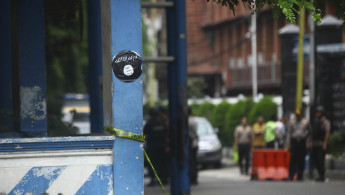Wife, child of jailed Indonesian militant die in retaliation suicide blast
The woman is believed to have detonated a suicide bomb hours after throwing a home-made bomb that injured an officer as police tried to search the house in Sibologa district on Tuesday, Dedi Prasetyo, the police chief, told The Associated Press.
Police officers at the location said there were two explosions and smoke at the house about 1:30 am, Prasetyo said. The woman had earlier refused calls from police and local leaders to surrender.
"Police are now still conducting sterilisation at the crime scene and finding a safe way to evacuate the bodies of the woman and her child," he said.
Prasetyo said the woman's husband, known as Husein, was arrested on Tuesday after the interrogation of another suspected militant, Rinto Sugiharto, who was apprehended in Lampung on Saturday, uncovered plans for attacks in Jakarta
Both men were members of Jemaah Anshorut Daulah, a militant network affiliated with the Islamic State group, police said.
IS attacks abroad have inspired Indonesian militants despite a sustained crackdown that obliterated an al-Qaeda affiliated network that was responsible for the Bali bombings in 2002 and other attacks.
In May last year, two families carried out suicide bombings at churches in Indonesia's second-largest city, Surabaya, killing a dozen people and two young girls whose parents had involved them in one of the attacks. Police said the father was the head of a local Jemaah Anshorut Daulah cell.
Aman Abdurrahman, the founder of the militant group was sentenced to death in 2018 after being accused of ordering the string of attacks from inside the prison in which he was being held.
Attacks carried out by the IS-affiliated groups in Southeast Asia, including the 2016 Jakarta bombings, have underlined a growing threat posed by the group in the region. Security forces have so far, however, been largely able to contain the threat posed by the militant group amid increasing propaganda efforts by their supporters.
"They [IS] are not a mass organisation, by definition. But it doesn't take many motivated and highly radicalised individuals to create havoc or force the state to over-react," Dr Zachary Abuza, a professor at the National War College and specialist on security in Southeast Asia, told The New Arab in January.
"The government has done a good job in mitigating the threat and Indonesia has great social resiliency against IS' ideology. But it is not going to simply go away," he added.
Agencies contributed to this report.
Follow us on Twitter: @The_NewArab





 Follow the Middle East's top stories in English at The New Arab on Google News
Follow the Middle East's top stories in English at The New Arab on Google News


